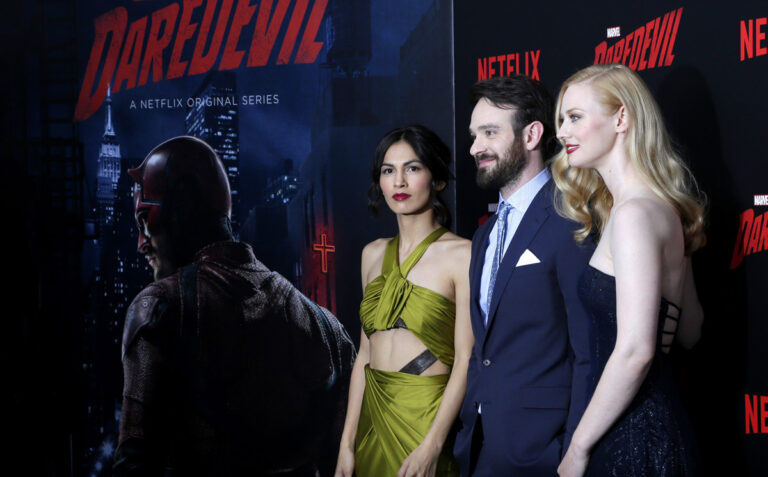10 cancelled Netflix series that deserve a second life (if not a second watch)
With the advent of the cancelled Good Girls—a show about three suburban women diving into the world of crime, drug lords and money laundering—making its way back into Netflix’s top 10 this week, we thought it’d be interesting to look back at some of the other series whose threads were cut way too soon.
According to Forbes, the anomaly that is Good Girls just keeps giving. Dubbing it “one of the most bizarre situations in television,” the article goes on to say that the show was axed after its fourth season before it even had the chance to conclude properly. Its finale episode aired in July of 2021, ending its short three-year presence on our screens. Without the sweet release of true catharsis, we were left without a rhyme or reason as to why it ended.
Clearly, the show was (and still is) crazy popular—so low viewer ratings is not it—with Forbes noting that the show still managed to edge its way into the streaming platform’s elusive number 2 spot on its US top 10 list. Though there’s been a lot of speculation as to why the show was cut, such as show leads Christina Hendricks’ (who plays Beth Boland) and Manny Montana’s (the internet’s heartthrob, Rio) rocky relationship—not to mention the supposed issue with Montana’s contract as well as the season five pay cuts. I won’t get too much into that though as we’re here to focus on the TV shows and only the TV shows.
So grab your shovels, folks—it’s time to enter Netflix’s cancelled-show graveyard and dig around for some gems.
1. Good Girls
Of course, I had to put Good Girls up in the top spot. How could you not want a finished ending to women who become so “fed up with playing by the rules and not getting the respect they deserve, they band together to take control of their lives by holding up a local grocery store”? It’s the perfect show—crime, comedy and Retta, what more could you want?
Maybe we really should get behind Forbes’ #SaveGoodGirls and bully some sense into the corporation. I mean, it worked for Manifest…
2. Castlevania
According to Business Insider, Netflix doesn’t really see the value in shows that exceed the 30 episodes mark and that couldn’t be more true in Castlevania’s case. Announced in mid 2021, the series was cancelled on its fourth season. The animated horror show, drawn from the series of video games of the same name, follows Trevor Belmont and Co. as they navigate a world of dark mediaeval fantasy filled with complicated vampiric hierarchy and the expansive world of witchcraft. The gothic horror action series definitely had a few more seasons of anarchic blood-shedding to offer its audience.
3. Grand Army
TVLine listed Grand Army on its roster for shows that shouldn’t have gotten away. Alongside American Vandal, The Society and On My Block, this one truly hurt as a zillenial who still lives for a bit of coming-of-age drama.
4. #blackAF
In 2021, rumours about the show’s success and its renewal greenlight for a second season began circulating, yet sadly, #blackAF was cancelled by the platform after, you guessed it, only one season. The black family mockumentary just didn’t do it for the streaming service. Deadline hinted that there’s still hope though, as there are talks that plans for the show in the idea mill include a movie franchise. Win, win, win, win, win, indeed, Kenya Barris.
5. Daredevil
Netflix’s dream to jump into the Marvel universe started off so well with Daredevil. Shortlist noted the structural plan for the Marvel universe shows—“each character getting their own show and an Avengers-like coming together in The Defenders”—was kind of genius. Unfortunately, it didn’t pan out for Daredevil, despite its three seasons being a success, which still pains me to this day.
One man’s trash is another mouse’s treasure it seems since, according to The Manual, the show is confirmed to return to the Marvel Cinematic Universe (MCU), only this time on Disney+, as stated by Marvel President Kevin Feige. Too bad Netflix didn’t see the series’ full value. But hey, at least we get that anticipated fourth season.
6. The OA
One of the many forgotten Netflix wonders you will find is The OA, and for good reason too. The show’s trailers remain unforgettable to this day though its two-season run has since faded into obscurity.
7. The Get Down
This one makes me so mad that I can’t even talk about it only having one season when a show beginning with ‘R’ and ending in ‘Dale’ still exists. Yeah, that’s still going strong, by the way… I think I need a minute, honestly. I’d still watch the entire season of The Get Down all over again anyway.
8. Sense8
Need I really say anything for this one?
9. I Am Not Okay With This
Remember that Insider article with showrunner Jonathan Entwistle? Only one season of beautifully dark comedy? Count your days, Netflix.
10. High Fidelity
Though it’s not a Netflix show, my honourable shoutout must go to Hulu’s High Fidelity starring Zoë Kravitz. Despite her being on bigger, better and more bat-ish things like 2022’s The Batman by Matt Reeves, I do lie awake at night wondering if she’ll ever reprise her role as Rob.
whole world talking about zoe kravitz so now how can we get high fidelity brought back
— ceo of kory (@korysverse) March 6, 2022





